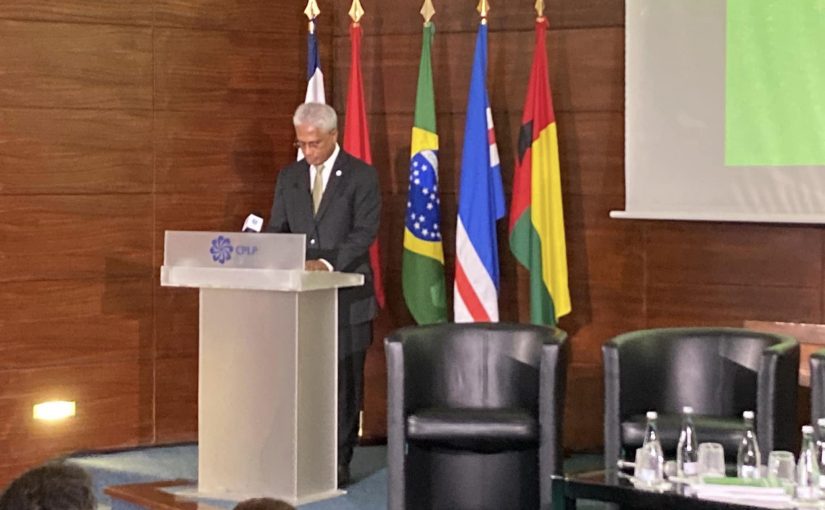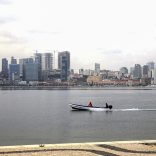Brazil's Bolsonaro guilty of coup charges, court majority decides in landmark trial
CPLP: African investment in regional value chains key to face new shocks – OECD

Photo: Camões, I.P.
African countries’ investment in regional value chains is “key to accelerating” their manufacturing industries and “improve the resilience of economies to the impacts of global crises,” according to an OECD report released on May 25, now available in Portuguese and presented on Wednesday (23 November) in Lisbon, Portugal.
“African regional value chains contribute less than 3% (2.7%) to global value chains, far below that of other regions such as Latin America and the Caribbean (26.4%) or Asia (42.9%),” said Ayumi Yuasa, deputy director of the Development Centre of the Organisation for Economic Cooperation and Development (OECD).
“Strengthening regional production networks can help African countries diversify their economic base and build their productive capacities,” she added.
The text provides Portuguese-speaking African countries (PALOP) with “statistical data, clues, recommendations for new public policies that allow them to overcome,” the combined crises of the Covid-19 pandemic, the war in Ukraine and the climate crisis resulting from climate change, noted the Portuguese Secretary of State for Foreign Affairs and Cooperation (SENEC), Francisco André.
André drew attention to the fact that less than 5% of exports from PALOP countries are destined for the African continent, which contrasts with 25% in terms of imports, according to the OECD text.
“This shows that boosting the African continental free trade area, combined with digital innovation for the development of new value chains, has what we all long for, which is many opportunities for all Portuguese-speaking African countries to capitalise on [their development potential], especially in the agriculture sector, at such a sensitive time in terms of food security,” said Francisco André.
The digitalisation of these value chains can allow African economic agents to access new markets and “the European Union and the CPLP [Community of Portuguese Language Countries] have a very important role to play, primarily through the Digital Agenda for the CPLP,” he added.
Speaking at the beginning of the presentation of the text at the CPLP headquarters in Lisbon, the organisation’s executive secretary, Zacarias da Costa stressed that member states need “more cooperation and international support to mitigate the crisis” in which they live.
“The CPLP calls for the collective responses of the international community in the short, medium and long term to be guided by respect for human rights, including the right to development. This is a commitment and a responsibility that we have to our peoples,” said the Timorese diplomat.
The OECD text looks in particular at the effect of the war in Ukraine on the performance of the economy on the continent and its retreat to levels of poverty from which it had emerged at the beginning of the millennium.
According to the OECD forecast, Africa’s economy will achieve 3.9% growth in its gross domestic product (GDP) in 2022, one percentage point below the growth rate for the rest of the world, which stands at 4.9%.
In 2022, Africa’s GDP as a share of world GDP is expected to fall to 4.7%, the lowest level since 2002, “which could reverse the convergence process that was underway,” Ayumi Yuasa pointed out.
“If the conflict in Ukraine continues, the growth of the continent’s economy will most likely be below 4% in 2023,” he added.
In the case of the PALOPs, recovery from the crises of the war in Ukraine and the Covid-19 pandemic remains very slow, with growth forecast to stay at 3.2% in 2022.
Five out of six PALOP countries, with the exception of São Tomé and Príncipe, entered into recession in 2022. This occurred essentially due to the lack of economic diversification, with the weight of the economy associated to oil representing about 74% of the PALOP’s exports. Hence the vulnerability to the shock of rising commodity prices, the text stresses.
“When we look at the impact of the war in Ukraine on Africa, the importance of the increase in ‘commodity’ prices was the most significant, between 6 and 10 billion dollars in annual financing needs,” Ayumi Yuasa stressed.
Under current conditions, Africa will need more than a decade to recover pre-covid-19 pandemic poverty rates and the war in Ukraine, the study points out.
“The crisis has had different effects in the various PALOP countries. Food prices rose by 25% in Angola, but 17% in Mozambique and 16% in Cabo Verde,” the organisation’s official noted.
“Oil exports from Angola or Equatorial Guinea may hide the impact of prices, given the increase in energy prices,” Ayumi added.
— CPLP (@_CPLP) November 17, 2022












Leave a Reply
Be the First to Comment!
You must be logged in to post a comment.
You must be logged in to post a comment.